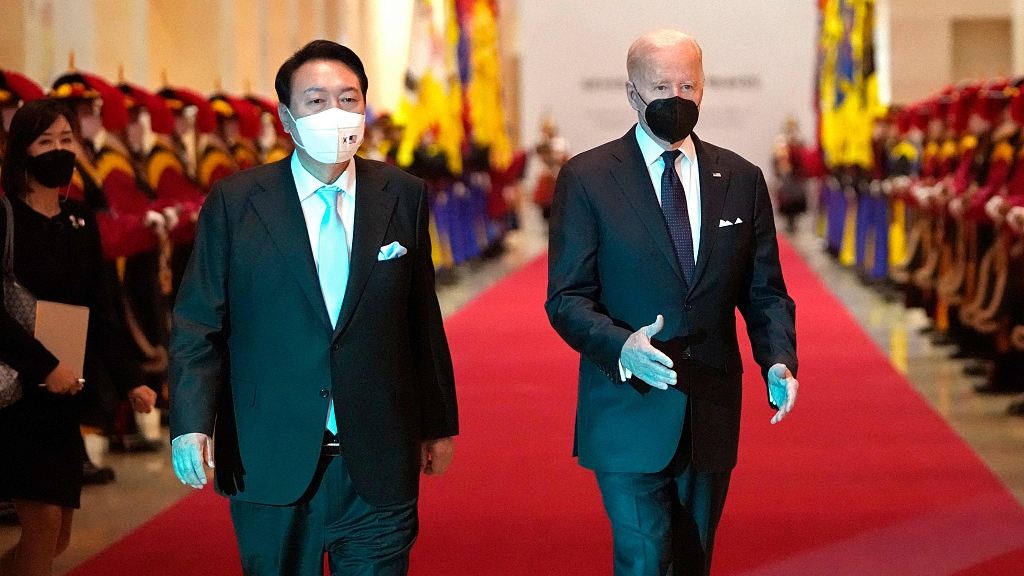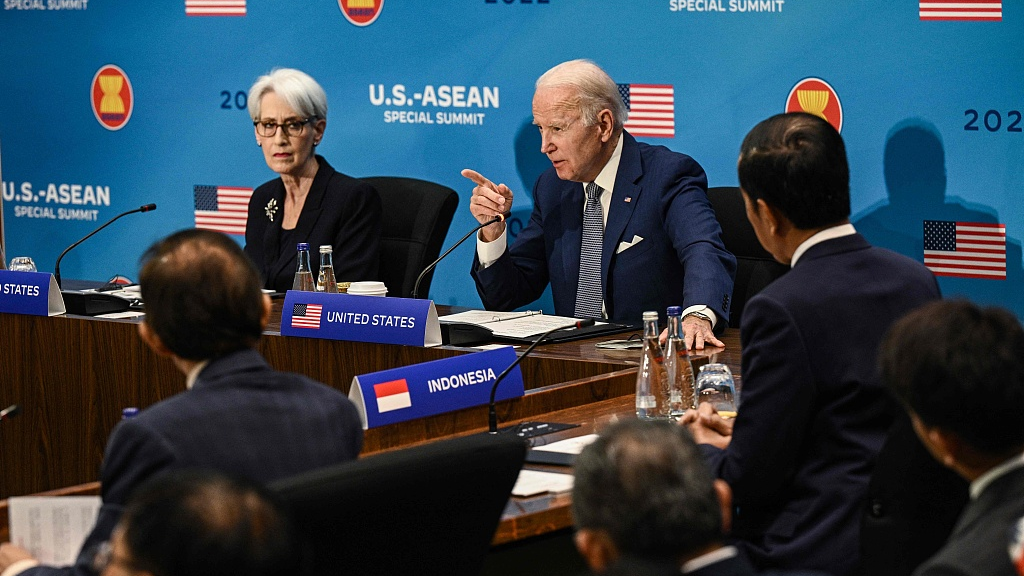
The Republic of Korea's (ROK) President Yoon Suk-yeol (L) and U.S. President Joe Biden arrive for a state dinner at the National Museum of Korea in Seoul, the ROK, May 21, 2022. /CFP
The Republic of Korea's (ROK) President Yoon Suk-yeol (L) and U.S. President Joe Biden arrive for a state dinner at the National Museum of Korea in Seoul, the ROK, May 21, 2022. /CFP
Editor's note: Bradley Blankenship is a Prague-based American journalist, political analyst and freelance reporter. The article reflects the author's opinions and not necessarily the views of CGTN.
U.S. President Joe Biden has just completed the Republic of Korea (ROK) leg of his first Asia trip, where he revealed the purpose of the entire journey: to sell Asian countries an American alternative to China.
Before he had even arrived, it was reported that the ROK government would confirm its participation in the U.S.-led Indo-Pacific Economic Framework (IPEF), a quasi-economic forum aimed at competing against China. It is part of the larger U.S. Indo-Pacific Strategy, which is essentially Washington's blueprint for undermining Asia's regional cohesion.
The two sides also, in an official statement, reaffirmed their defense commitments under the ROK-U.S. Mutual Defense Treaty. According to the White House's version of that statement, "President Biden affirms the U.S. extended deterrence commitment to the ROK using the full range of U.S. defense capabilities, including nuclear, conventional, and missile defense capabilities."
The Biden administration has tried to paint its diplomatic efforts in Asia as a mixture of economic and military, but they are overwhelmingly military-dominated. This is because the U.S. doesn't actually have a coherent economic plan in Asia.
Starting with the IPEF, it's clear that it's meant to undercut regional spaces where China is involved, such as the Regional Comprehensive Economic Partnership (RCEP), the world's largest free-trade agreement, the Comprehensive and Progressive Agreement for Trans-Pacific Partnership (CPTPP) and the Belt and Road Initiative. It is clearly meant to exclude China from supply chains in the Indo-Pacific, encourage countries to decouple from China, and undermine China's influence.
However, the IPEF simply cannot replace these structures with the U.S. being constrained by domestic politics. The IPEF is not a trade agreement – and that's primarily because a trade agreement would need to be authorized by Congress, which would never happen in the current political climate.
Average Americans have been so wrecked by so-called "free trade" – which often just means corporations writing preferential trade agreements that trade protectionism has become the norm for both major political parties. This was why former President Donald Trump pulled the United States out of the CPTPP immediately upon taking office.

U.S. President Joe Biden (C) participates in the U.S.-Association of Southeast Asian Nations (ASEAN) special summit at the U.S. State Department in Washington, D.C., the U.S., May 13, 2022. /VCG
U.S. President Joe Biden (C) participates in the U.S.-Association of Southeast Asian Nations (ASEAN) special summit at the U.S. State Department in Washington, D.C., the U.S., May 13, 2022. /VCG
As a result, the U.S. cannot sign any sort of trade agreements to compete with, for example, the RCEP since it would mean expanding market access for foreign companies. Of course, Biden noted instances of economic cooperation with ROK during his visit, but it was only in the superficial context of "creating jobs" or in special instances where the two can pool resources to compete with China. Other than that, the U.S. is not interested in free trade.
On the contrary, China has a massive market – and one that is so attractive that countries are basically falling over themselves to gain access through agreements, like the RCEP or the China-EU Comprehensive Agreement on Investment. China's style of economic cooperation pivots on mutuality and win-win cooperation; meanwhile, the U.S. only enters agreements that further its narrow self-interest.
In addition to having no serious plan to rebalance its economic relations with Asian countries, the U.S. has also shown a remarkable lack of will to invest in the region. For example, the outcome of the latest ASEAN-U.S. Summit hosted in Washington, D.C. this month was that the U.S. pledged to invest $150 million in several initiatives, including maritime cooperation, infrastructure development and others. Any way you slice it, it was clearly designed to provoke China and pull China's neighbors into more aggressive posturing somehow.
Nonetheless, this price tag – which is a reliable metric for domestic political priorities – shows that the U.S. either doesn't or can't make ASEAN a priority. Consider that the U.S. Senate just approved an appropriations package that will see over $100 million sent to Ukraine, primarily in the form of weapons, moments after the Senate passed a $40 billion supplemental aid bill for Ukraine.
It shows that the U.S. won't put its resources into those programs that world leaders care about the most, e.g., ones that benefit their people, but is more interested in militarizing the neighborhoods of its political adversaries, namely Russia and China.
This is precisely why ROK's decision to sign on to the U.S.-led IPEF and affirm support for housing U.S. weapons, including nuclear arms, is a bad deal. Such policies will not benefit average Koreans or bring peace or prosperity to the peninsula or the region. It will, in fact, accomplish the opposite – and this only plays to Washington's cynical advantage.
(If you want to contribute and have specific expertise, please contact us at opinions@cgtn.com. Follow @thouse_opinions on Twitter to discover the latest commentaries in the CGTN Opinion Section.)

